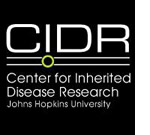Last updated: May 05, 2016
NHGRI Affiliated Centers
NHGRI Affiliated Centers
- Center for Inherited Disease Research
- Center for Research on Genomics and Global Health
- National Institutes of Health (NIH) Intramural Sequencing Center
The National Human Genome Research Institute (NHGRI), in collaboration with other components of the National Institutes of Health (NIH), is closely associated with several major centers involved in genome research. These affiliated centers are:
Center for Inherited Disease Research [cidr.jhmi.edu]
 The Center for Inherited Disease Research (CIDR) is a centralized facility that provides genotyping, sequencing and statistical genetics services for qualifying National Institutes of Health (NIH)-supported projects. These services are available to extramural and intramural scientists supported by institutes participating in the CIDR program.
The Center for Inherited Disease Research (CIDR) is a centralized facility that provides genotyping, sequencing and statistical genetics services for qualifying National Institutes of Health (NIH)-supported projects. These services are available to extramural and intramural scientists supported by institutes participating in the CIDR program.
CIDR's main focus is high-throughput projects relating to human traits associated with health and disease. Projects and projects involving a variety of model organisms can also be accommodated. In addition to producing large-scale genomic data, the CIDR program also facilitates the deposition of these data sets in central databases where they can be used by other scientists.
CIDR's mission is to support the genetics community by providing high quality, cutting-edge genomic service and technologies in order to expand our understanding of human biology and disease and catalyze discoveries that translate to patient care.
Currently, 11 NIH institutes participate in the CIDR program: The National Cancer Institute (NCI); the National Eye Institute (NEI); the National Human Genome Research Institute (NHGRI); the National Institute on Aging (NIA); the National Institute on Alcohol Abuse and Alcoholism (NIAAA); the National Institute of Arthritis and Musculoskeletal and Skin Diseases (NIAMS); the National Institute of Child Health and Human Development (NICHD); the National Institute on Deafness and Other Communication Disorders (NIDCD); the National Institute of Dental and Craniofacial Research (NIDCR); the National Institute of Environmental Health Sciences (NIEHS);), and the National Institute of Neurological Disorders and Stroke (NINDS).
Access to CIDR is granted via a peer review process (NIH program announcement: PAR-14-207).
The facility is supported through a five-year, $102 million federal contract (numberHHSN268201200008I) to The Johns Hopkins University (JHU) with Drs. Kim Doheny, David Valle and Alan Scott of the JHU Institute of Genetic Medicine and Johns Hopkins Genomics as co-principal investigators. Dr. Lawrence C. Brody,NHGRI, serves as CIDR's chief scientific officer. Mr. Jon W. Garvey, NHGRI, serves as government project officer. Dr. Barbara Thomas, NHGRI, serves as scientific review officer and executive director of the CIDR Board of Governors.
Center for Research on Genomics and Global Health [crggh.nih.gov]
 The Center for Research on Genomics and Global Health (CRGGH) aims to facilitate a global understanding of the relationship between human genetic variation and population differences in disease distribution, with the ultimate goal of informing health inequalities. Investigators in the CRGGH will develop genetic epidemiology models that will explore the patterns and determinants of common complex diseases in populations in the United States and other human populations around the world. The establishment of the CRGGH, a trans-National Institutes of Health (NIH) effort, brings about an opportunity for it to be a leader in public awareness regarding how genomics is informing health and human history.
The Center for Research on Genomics and Global Health (CRGGH) aims to facilitate a global understanding of the relationship between human genetic variation and population differences in disease distribution, with the ultimate goal of informing health inequalities. Investigators in the CRGGH will develop genetic epidemiology models that will explore the patterns and determinants of common complex diseases in populations in the United States and other human populations around the world. The establishment of the CRGGH, a trans-National Institutes of Health (NIH) effort, brings about an opportunity for it to be a leader in public awareness regarding how genomics is informing health and human history.
National Institutes of Health (NIH) Intramural Sequencing Center [nisc.nih.gov]
 The NIH Intramural Sequencing Center (NISC), established in 1997, is a multi-disciplinary genomics facility that emphasizes the generation and analysis of DNA sequence. In addition to providing investigators at the NIH access to large-scale DNA sequencing, NISC plays a major role in several efforts related to the Human Genome Project. These include a Comparative Vertebrate Sequencing Initiative, the ENCODE Project, and the Mammalian Gene Collection Program.
The NIH Intramural Sequencing Center (NISC), established in 1997, is a multi-disciplinary genomics facility that emphasizes the generation and analysis of DNA sequence. In addition to providing investigators at the NIH access to large-scale DNA sequencing, NISC plays a major role in several efforts related to the Human Genome Project. These include a Comparative Vertebrate Sequencing Initiative, the ENCODE Project, and the Mammalian Gene Collection Program.
- NIH Intramural Sequencing Center (NISC) 10th Anniversary Symposium
To commemorate NISC's 10th anniversary, the National Human Genome Research Institute (NHGRI) held a one-day symposium on Oct. 16, 2007 in the Masur Auditorium of the Clinical Center, on the Bethesda, Maryland campus.
